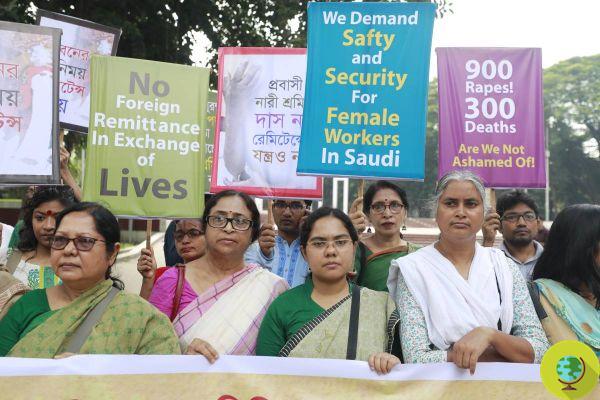
A new world of work in Qatar and Saudi Arabia: minimum wage, freedom to change jobs and travel for foreign employees
Don't store avocado like this: it's dangerousQatar and Saudi Arabia are progressively reforming their labor market. Through a series of ad hoc laws, the two countries have agreed to a significant lightening of the traditional system of kafāla, an institution of Islamic derivation based on the sponsorship of the foreign worker by the local employer (kafīl), who however, he risks becoming a "slave master" capable of severely limiting the personal freedom of the worker subjected to him.
In Qatar, a new law came into force on March 13, introducing the minimum salary for foreign workers employed in the country. This is the first measure of this type adopted in the entire Gulf region.
In Saudi Arabia, foreign workers can now freely change jobs, move and travel abroad without the permission of their employers. A few steps forward with a view to respecting migrant workers who seek fortune and economic stability by going to the Gulf countries.
Index
The case of Qatar and the minimum wage
A first fact to consider is that in Qatar, out of a population of 2.7 million people, indigenous citizens are only 300.000.
Thanks to the new minimum wage law, around 300.000-400.000 beneficiary workers - representing 20% of total private sector employees and working in more than 5.000 companies - are entitled to a minimum monthly wage of 1.000 Qatari riyals (approximately € 230) and a minimum allowance of 300 riyals for food and 500 riyals for accommodation, only if the employer does not already provide the worker with board and lodging.
Big day?: #Qatar’s new non-discriminatory minimum wage comes into force ??The @ILO continues to work with the Govt of ??, workers and employers on the implementation of the labour reform agenda. @ADLSAQa @MaxTunonILO @QatarLabour_GE https://t.co/JMIjOZ9Fc0 pic.twitter.com/imGVNgmkWz
— ILO Project Office for the State of Qatar (@ILOQatar) March 20, 2021
Furthermore, in August 2020, Qatar abolished a rule that it prevented the foreign worker from changing employment without the consent of your employer; it was an unfair practice, which placed the immigrant worker in a relationship of total subordination with respect to his employer, legitimizing abuse and exploitation.
According to statements by the Qatari government, the new legislative framework has already contributed to the transfer of over 78.000 employees. However, in many cases, when the foreign worker communicates the decision to leave the old job for a new one, the former sponsor continues to oppress him through threats, mistreatment and exploitation, which in some situations leads to detention in prison and the repatriation of the worker.
Among other things, Qatar is still at the center of a scandal of international significance due to the systematic exploitation and death in the workplace of thousands of workers employed in the construction sites of the large infrastructural works planned for the world football championship, which the country will host in 2022.
Read also: Over 6 foreign workers died in the construction sites of the 2022 World Cup in Qatar
The Saudi reform
Less than a year later, Saudi Arabia has also followed the same path, approving a law on March 14th.
In the Saudi kingdom, in the context of an important reform period in the field of employment, foreign workers will finally be able to decide independently to change jobs when the contract expires, without having to obtain the permission of their employers.
Workers will be able to change employment even if the contract is still in place, on condition, however, that they inform their employers with adequate notice.
Foreign workers will also be exempted from requesting authorization from the sponsor in the event of leaving (and returning to) the country, allowing them to travel indefinitely without having to ask their employers for permission.
Ministry of Human Resources and Social Development Launches Labor Reforms for Private Sector Workers. pic.twitter.com/5Xw4hvHeqt
— Ministry of Human Resources and Social Development (@HRSD_SA) November 4, 2020
Finally, some new provisions also concern workers without an employment contract and those who have been denied the wages due.
Towards the abolition of kafāla?
In fact, human rights associations have long been fighting to put an end to the kafāla system in the Gulf, which makes migrant workers real. slaves wealthy entrepreneurs or ordinary citizens, who check their residence and work visas.
Foreign workers, according to the strict provisions of the kafāla, would not in fact be free to leave their jobs, to resign, to move, to return to their country of origin or elsewhere because they are often deprived of a passport and any form of economic independence, like the simple freedom to open a bank account or to dispose of one's salary, sometimes denied in the face of hours and hours of work in conditions of absolute exploitation.
In particular, those who work in construction and carry out domestic work are more vulnerable, therefore more exposed to abuse, including psychophysical, by their respective sponsors.
Sources: Treccani / Al-Jazeera / Al-Arabiya
Read also:
- Saudi Arabian foreign slave "maids": abused, tortured and beaten to death by employers


























